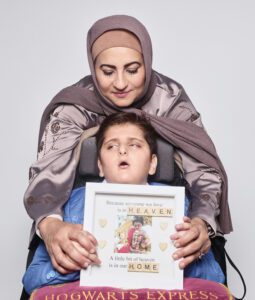Riffat is a mum to Saad, aged 11. Saad has Osteopetrosis, (Marble bone disease) a rare genetic condition that causes bones to become very dense and brittle. Riffat also had a daughter, Zoha, who sadly died at the age of 22 and who had the same condition as Saad.
 Zoha died on 21st of December 2020 at The Royal Free Hospital in North London. Zoha’s death was devastating for Riffat but she says that her devout faith in Islam saw her through the worst of her grief. There are strict protocols around death in Islam which Riffat carefully observed and in which she found comfort, peace and closure.
Zoha died on 21st of December 2020 at The Royal Free Hospital in North London. Zoha’s death was devastating for Riffat but she says that her devout faith in Islam saw her through the worst of her grief. There are strict protocols around death in Islam which Riffat carefully observed and in which she found comfort, peace and closure.
Riffat says:
‘It was the hardest experience for me because it was during Covid, Zoha’s body was taken and kept in the hospital mortuary where I didn’t have access to her. The imam then arranged for Zoha to be moved to the funeral section of the mosque, where I washed her body and wrapped it in a white cloth called a ‘kafan’. We also added fragrance and said prayers over Zoha before placing her in a box, called a ‘tabut’, and then the community and us parents and Saad came to say goodbye for the last time.’
Riffat talks about the ways in which Zoha both challenged and enriched her life, saying:
‘I gave my daughter her last bath and prepared her coffin and it gave me comfort that I was able to do all her rituals with my own hands and complete our last chapter together. Through her, I had all these brand-new experiences, conceiving her, giving birth to her, raising her and going through her 22 major surgeries. I learned everything about life and everything about death through my daughter. She was an amazing person who taught me everything, a wonderful mentor!.’
Riffat says that the guidance she received from the imam and the mosque at this time was invaluable, helping with everything for funeral arrangements from practical advice on the rituals to more spiritual aspects of death within Islam. Zoha was buried in Hendon Cemetery facing Mecca, the holiest city in the Islamic faith, on the 24th of December 2020, as the Islamic faith dictates that the burial should take place as soon as possible after death. Islam also provides a framework for grief and prescribes a set period for mourning, Riffat explains:
‘As Muslims we are only allowed to grieve for three days and then get on with life because the person who has left you was sent by Allah, He sent them and He takes them back but I took three years to come into terms with this grief.’
Riffat talks about how her faith has supported her in her darkest moments:
‘My faith, my religion has been my biggest rock. I’m so blessed to be a Muslimah, that Allah chose me to be a Muslimah ( female Muslim) and that there is a book of guidance and commandments, the Holy Quran, that I can follow in all situations of life for my guidance.’
 Riffat also needed the support of friends in the three-day-period after Zoha’s funeral as the Quran encourages the relatives and friends to look after the deceased family for three days and beyond if need be so that they don’t have to worry about cooking, washing etc during this difficult time. Riffat’s friends also brough her food and one made a beautiful floral creation for Zoha from her brother Saad. It read ‘Appi Zoha’ which means ‘Older Sister Zoha’ in Urdu.
Riffat also needed the support of friends in the three-day-period after Zoha’s funeral as the Quran encourages the relatives and friends to look after the deceased family for three days and beyond if need be so that they don’t have to worry about cooking, washing etc during this difficult time. Riffat’s friends also brough her food and one made a beautiful floral creation for Zoha from her brother Saad. It read ‘Appi Zoha’ which means ‘Older Sister Zoha’ in Urdu.
Every year on Zoha’s birthday, Riffat places things Zoha would have liked on her grave, crinkly things, glittery things pink flowers – things to keep the connection between them alive. The biggest comfort for Riffat is that Islam says that she will see Zoha again, she says:
‘That is the biggest hope and relief for me because the life in this world is only temporary but the Quran says that all those who have done good deeds will gather again in Jannah (Paradise). I hope that one day we will all live together again, forever in a place where there is no disability, no limitations and where we are all happy and young forever’.